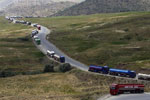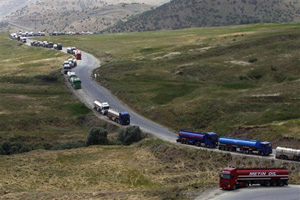 Wall Street Journal: Iran is preventing nearly 2,000 fuel tanker trucks from crossing into Afghanistan, claiming their load would supply U.S.-led coalition forces, Afghan officials say.
Wall Street Journal: Iran is preventing nearly 2,000 fuel tanker trucks from crossing into Afghanistan, claiming their load would supply U.S.-led coalition forces, Afghan officials say.
The Wall Street Journal
By MARIA ABI-HABIB
 KABUL—Iran is preventing nearly 2,000 fuel tanker trucks from crossing into Afghanistan, claiming their load would supply U.S.-led coalition forces, Afghan officials say.
KABUL—Iran is preventing nearly 2,000 fuel tanker trucks from crossing into Afghanistan, claiming their load would supply U.S.-led coalition forces, Afghan officials say.
The unannounced border blockade, which has entered its third week, threatens to push up fuel prices ahead of Afghanistan’s severe winter, depriving the Kabul government of millions of dollars in customs revenue, these officials say.
About 30% of Afghanistan’s fuel imports come through its western border with Iran, according to the country’s commerce ministry. The Afghan government says all of these imports are for civilian use.
Asked whether some of its fuel comes through the Iranian border, the U.S.-led coalition said it “does not discuss which supply routes [are] used and the status of logistical operations for security reasons.” The bulk of the coalition’s fuel is shipped from the former Soviet republics in Central Asia, Western officials in Afghanistan say.
While Iran has generally good relations with Afghan President Hamid Karzai, whose office says it receives a regular cash subsidy from Tehran, the Iranian regime opposes the presence of American troops in the country. American officials have repeatedly said Iran helps fund and arm some insurgent groups operating in Afghanistan. Millions of Afghans work in Iran, a more-prosperous and developed country, and trade between the two is booming.
Afghan officials say the stranded fuel, which includes Iranian imports and supplies transiting via Iran from Iraq and Saudi Arabia, is used to heat ordinary Afghans’ homes, run businesses and fly civilian aircraft.
“This is going to hurt all of Afghanistan. We’re a landlocked country, and our businesses and people rely on fuel from Iran,” said Walid Tamim, the vice chairman of Dawi Oil, which imports civil aviation fuel into Afghanistan.
About 600 fuel tankers are stuck on the Iranian border with Afghanistan’s southwestern Nimroz province, said Nimroz customs chief Ilhamuddin Mazhar, and similar-size backlogs have built up on the borders of the western Herat and Farah provinces.
Tehran never formally announced the border ban. But in private discussions with Afghan authorities, Iranian officials have claimed this fuel supplies the U.S.-led coalition in Afghanistan, according to top Afghan government officials.
Afghanistan, which said it contacted the Iranian government at the start of the blockade, hasn’t yet received an official response on when fuel imports would resume, said Sharif Shairifi, Afghanistan’s deputy minister of commerce.
The Iranian Embassy in Kabul declined to immediately comment on the matter, and Iran’s mission to the United Nations in New York didn’t respond to requests to comment.
The U.S.-led coalition, which confirmed the Iran blockade, said the fuel-supply disruptions aren’t affecting its operations.
Mr. Shairifi said ordinary Afghans could soon face fuel shortages—just as temperatures drop below the freezing point through much of the country.
Afghanistan is also losing millions of dollars in customs revenue from the dispute. Nimroz province alone has lost about $3.5 million in customs fees in the past two weeks and Farah and Herat provinces are equally affected, Mr. Mazhar said.
Iran isn’t the only country halting the flow of supplies to Afghanistan. In September, Pakistan shut down the main border crossing with Afghanistan for several days, in retaliation for coalition aircraft violating Pakistan airspace. The border was reopened after the coalition apologized.
Mr. Tamim from Dawi Oil said his company often must find alternative routes because of unpredictable border operations, costing his business thousands of dollars. Dawi Oil imports most of its fuel through Uzbekistan and Pakistan, but uses the Iranian border as well.
“The Afghan government needs to work to keep borders open with regional governments through official agreements,” Mr. Tamim said. “My business is constantly affected by our neighbors closing their borders whenever they want to.”
—Arif Afzalzada
contributed to this article.


